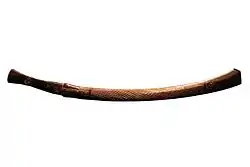あいくち
Japanese

あいくち (aikuchi): a short sword with the aikuchi construction, with no crossguard and the hilt fitting directly against the scabbard.
Etymology
Compound of 合い (ai, “fitting together”, 連用形 (ren'yōkei, “stem or continuative form”) of the verb 合う (au, “to fit together, to match, to go well together”).) + 口 (kuchi, “mouth; opening”).[1][2][3]
Noun
あいくち • (aikuchi)
- 合口, 合い口: compatibility, rapport, or cooperativeness in anything done together with others
- 合口, 合い口: getting along well with others, affinity
- Synonym: 相性 (aishō)
- 合口, 合い口: the join or fit between stones or bricks in masonry or other wall building
- Synonym: 合端 (aiba)
- 合口, 合い口: the join or fit between a lid and a container
- 合口, 合い口: a style of constructing a 短刀 (tantō, “short sword; dagger”) without a crossguard, so that the hilt fits directly against the opening of the scabbard
- 匕首, 合口, 合い口: a specific type of dagger with no crossguard, where the hilt fits directly against the opening of the scabbard, often kept concealed in one's clothing
See also
References
- 1988, 国語大辞典(新装版) (Kokugo Dai Jiten, Revised Edition) (in Japanese), Tōkyō: Shogakukan
- 2006, 大辞林 (Daijirin), Third Edition (in Japanese), Tōkyō: Sanseidō, →ISBN
- 1995, 大辞泉 (Daijisen) (in Japanese), Tōkyō: Shogakukan, →ISBN
This article is issued from Wiktionary. The text is licensed under Creative Commons - Attribution - Sharealike. Additional terms may apply for the media files.